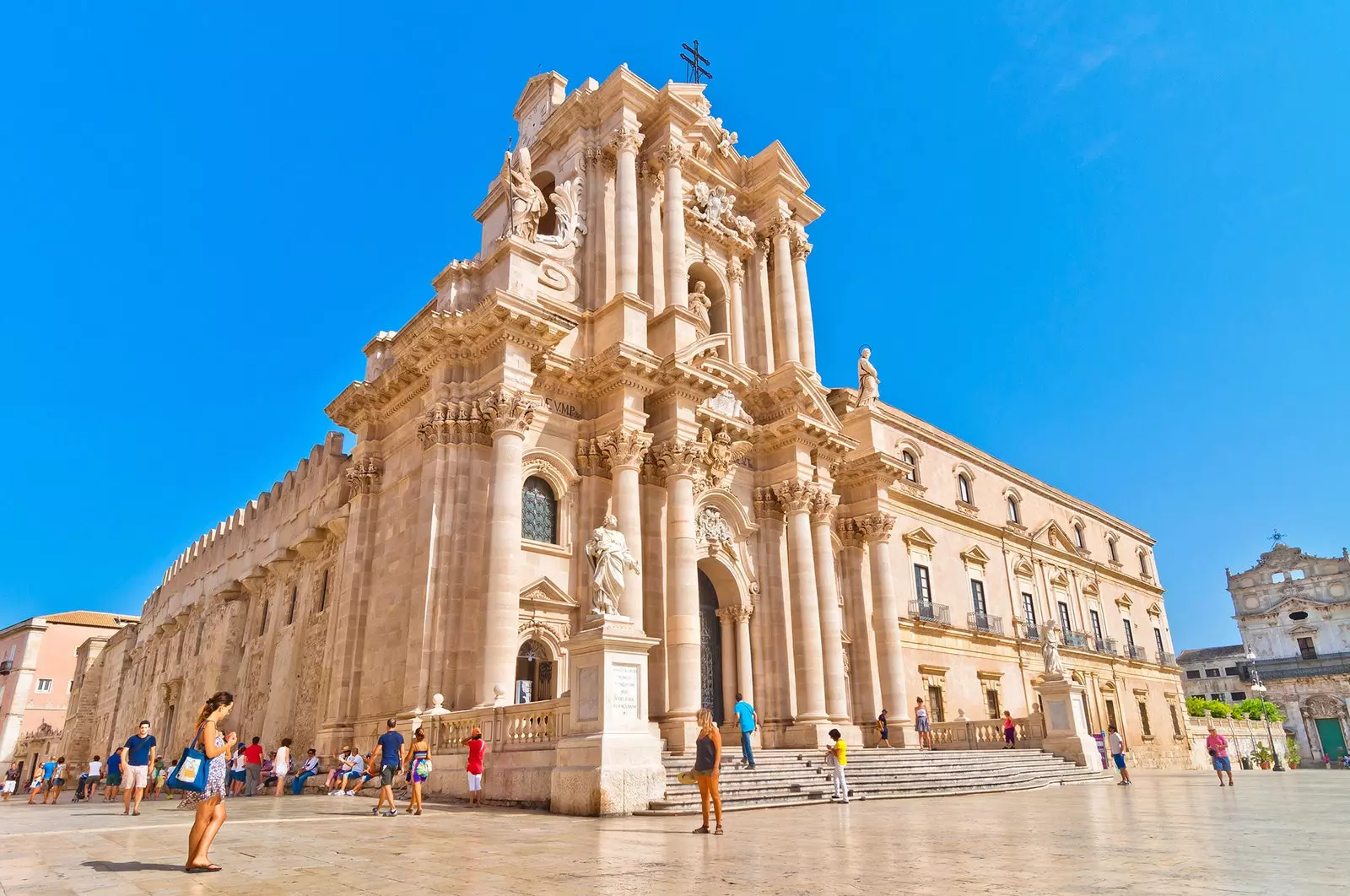
The ocher stone masses are inserted in the Baroque factory Duomo
Imagine traveling on a Greek-speaking sailboat, following the sun westward in search of a safe harbor. The storm pushes them toward a natural inlet whose waters are protected by a wide, flat spur of ocher rock, and there they land, praying for water.
where they least expected it, Under some rocky cliffs, the sailors find a spring of fresh water that sprouts a few meters from the ocean, spilling over the waves. That can only be the work of the gods, or perhaps the abode of one. Guided by the strength that comes from knowing oneself on divine ground, Greeks and Phoenicians decided to build on that island, next to the spring, the most famous city among the Hellenic colonies: Syracuse.
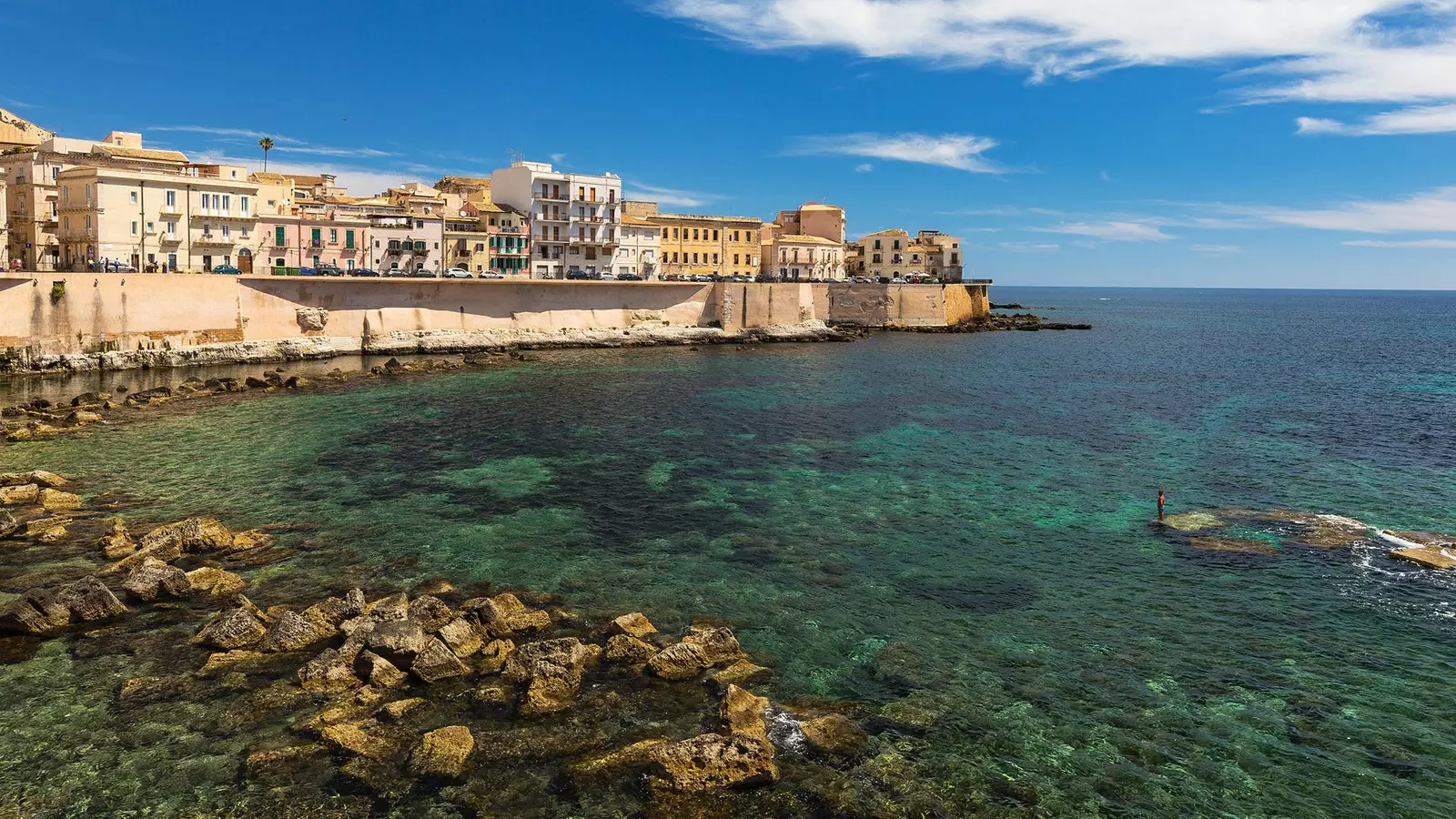
Island of Ortygia, the place where the old town of Syracuse is today
The spring took the name of "Fountain of Arethusa", and the ancient Greek myths made sense. That stream surrounded by waves could only be that naiad, the young Arethusa, turned into sweet water to escape from the god Alphaeus, another river deity. However, the god found her, despite Artemis's efforts to provide the girl with a safe haven in the island of ortygia , where today the historic center of Syracuse sits.
The myth of Arethusa and Alphaeus literarily represents, as only the Greeks could foresee, the historical evolution of the city. Founded by greek settlers seeking to escape the poverty of the Peloponnese, Greece never quite let the Syracusans go. The Athenians and their allies from the Delian League tried to catch the city in the tangle of the Peloponnesian War, starring one of the most famous sieges of antiquity.
Syracuse sat and sits on the island of Ortigia, the refuge provided by Artemis for Arethusa, and there, like the young Naiad, the Syracusans resisted the naval attacks of the Athenians, famous sailors whose galleys were the most feared war machine in the Mediterranean.
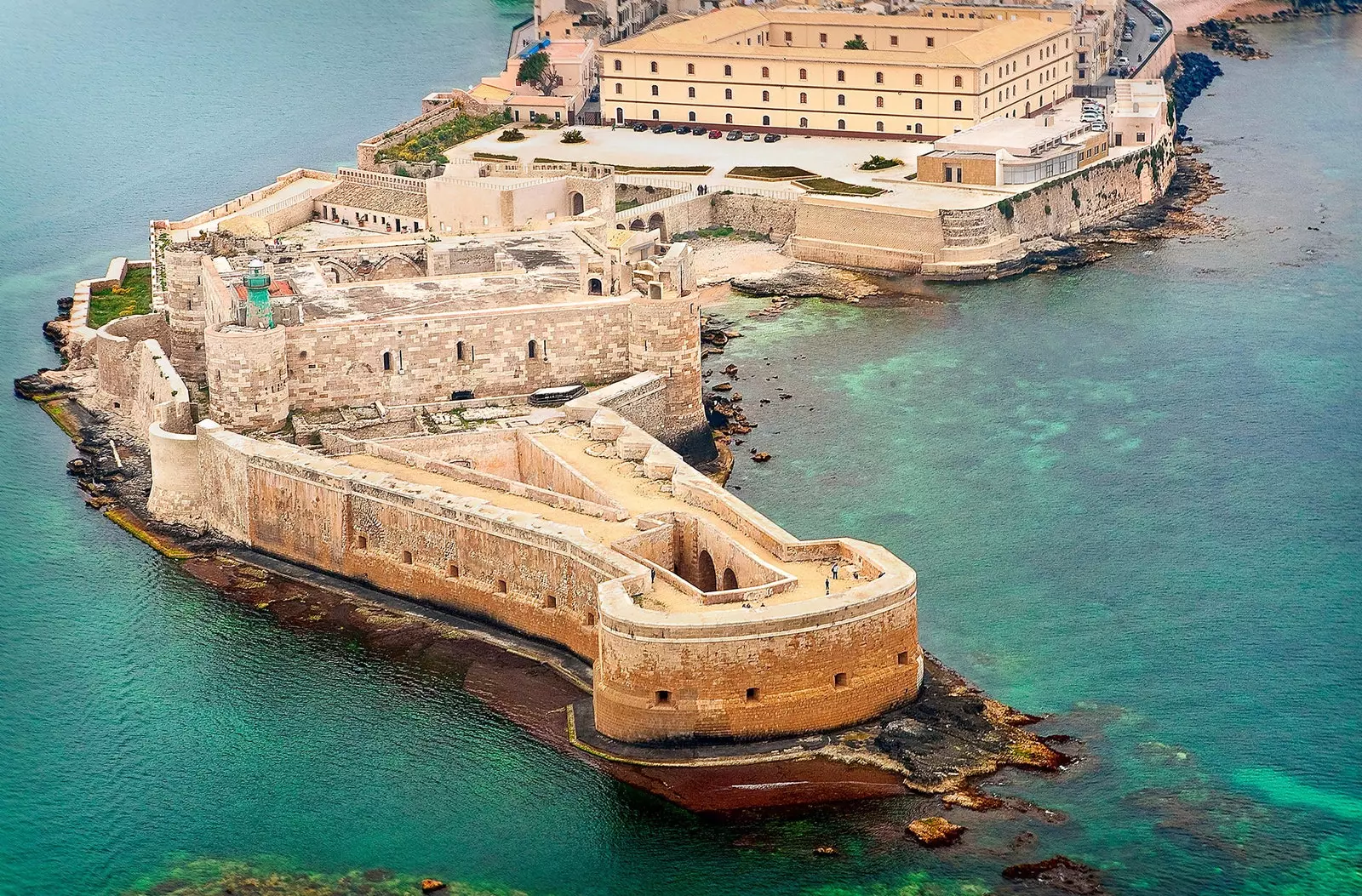
Castle Maniace
the syracusans They asked Sparta for help. and she replied by sending only one of her generals, named Asshole. It was this Spartan, raised in the iron Laconian society, educated with the sole purpose of winning battles, who managed to lead the Syracusans to victory, coining a saying that would make the Athenians who listened to him in his agora cry with shame: "A single Spartan is worth more than two thousand Athenians."
These words will ring in our ears when we look into Minerva Square and we feel small when contemplating the doric columns of the old temple of Artemis. The ocher stone masses are inserted in the Duomo of baroque factory, as if antiquity wanted to cling to the city, and in turn, Syracuse was reluctant to let go of the past.
Arethusa escapes from Alphaeus, who in turn, With his obsessive determination, he creates a dream place where time does not pass. This thought becomes recurrent when, from Plaza Minerva, we walk south, towards to the castle of Maniaces. The arches of the houses, of good white stone, seem to host meetings of swordsmen waiting for their victim, a high official of the Spanish crown or a Sicilian count with unpayable debts. The rooftops house life and bustle, and from the patios covered by splendid bougainvillea emerge playful children and mischievous dogs that smell of the pasta alla norma prepared by their grandmothers. As this island should always have been, and as it will never cease to be, youth and old age come together as the Doric capitals of the Duomo wonder where time is, and why it stopped in Syracuse.
To the west of the Teatro Comunale opens a labyrinth of alleys that could well belong to a Tunisian medina, whose aromas reach far across the Mediterranean. The Muslims, like the Athenians, also fixed their ambitions on the ever-buoyant city of Syracuse. The Mohammedans, however, did manage to overcome the city's natural defenses, and Syracuse was Muslim for more than two hundred years.
The cultural heritage that the African conquerors brought with them was felt in Sicilian art and architecture, and still is in its gastronomy. Sweets are a separate culture on the island: deserve honorable mention crispy cannoli, whose dough, fried in oil, smells of cinnamon and tastes of pistachio, transporting us with its cream to African latitudes.
Purely Greek, Latin and Mediterranean is the Sicilian taste for what they themselves call “cibo di strada”, “street food”, served in all kinds of street stalls that dot every corner of the island's cities and towns. There you can taste the pani ca meusa , rolls stuffed with spleen and veal lung sautéed with lard.
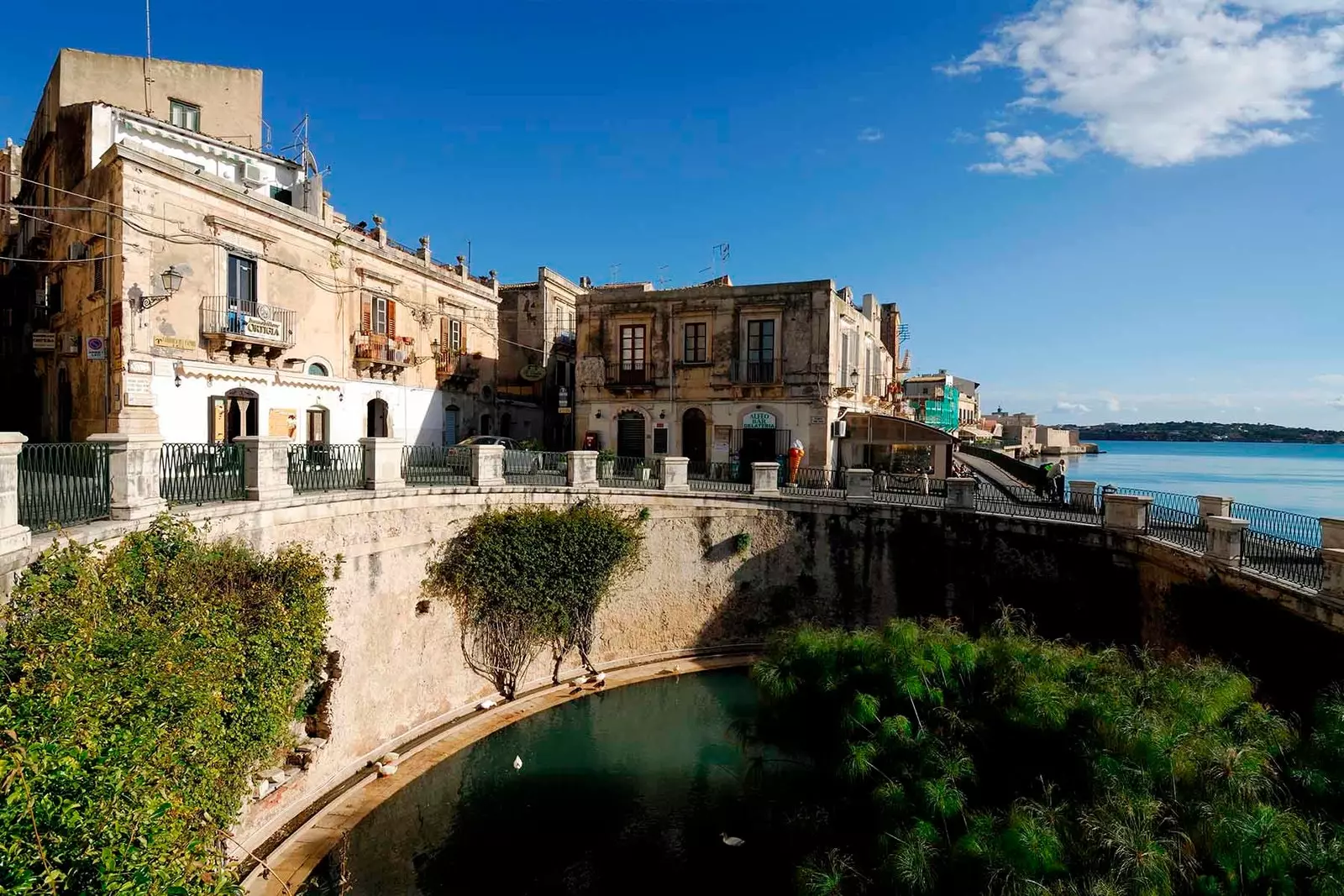
Walking through Syracuse, one has the feeling that time does not pass
Offal lovers will touch nirvana, while the rest will wonder what fly has bitten the editor to recommend such a sandwich. The reason is simple: eating a pani ca meusa you can experience the history of Syracuse on your palate. First, a strong aftertaste, of war and survival aroma of oriental, Greek and Phoenician spices. After, a grandiose calm in which the taste of meat expands, giving birth to stars like Archimedes, symbol of the golden age of the city. later arrives the last salty aftertaste, the lard clinging to the strong flavors of the fried spleen, causing an aroma similar to fried Serrano ham.
And it is here, when remembering our national sausage, when appears before us the history of a Syracuse that for centuries was part of the Hispanic Monarchy, whose ties with the peninsula have never been completely undone.
There is a lot of Andalusia in the garden patios of Siracusa, as well as Mérida and Córdoba. One feels south of the Tagus when looking at the ruins of the temple of Apollo, getting lost in the bustling markets, and perceiving in the shouts of the shopkeepers the taste for their trade. The sun burns and the sky shines while the Mediterranean acts as a mirror for the lands that look at it, showing the faces of those who share its shores.
Hanging our feet from the walls that surround the castle of Maniaces, while the seagulls cry pitiful around us and the foam of the sea splashes our sandals, we will feel that Siracusa invites us to sleep, as if we were at home, rocked by her arms. Arethusa's last hideout, Artemis's house, has always offered a mattress to those who have entered respecting: and as a good Sicilian lady, she will only show herself to those who first prove to know her past.
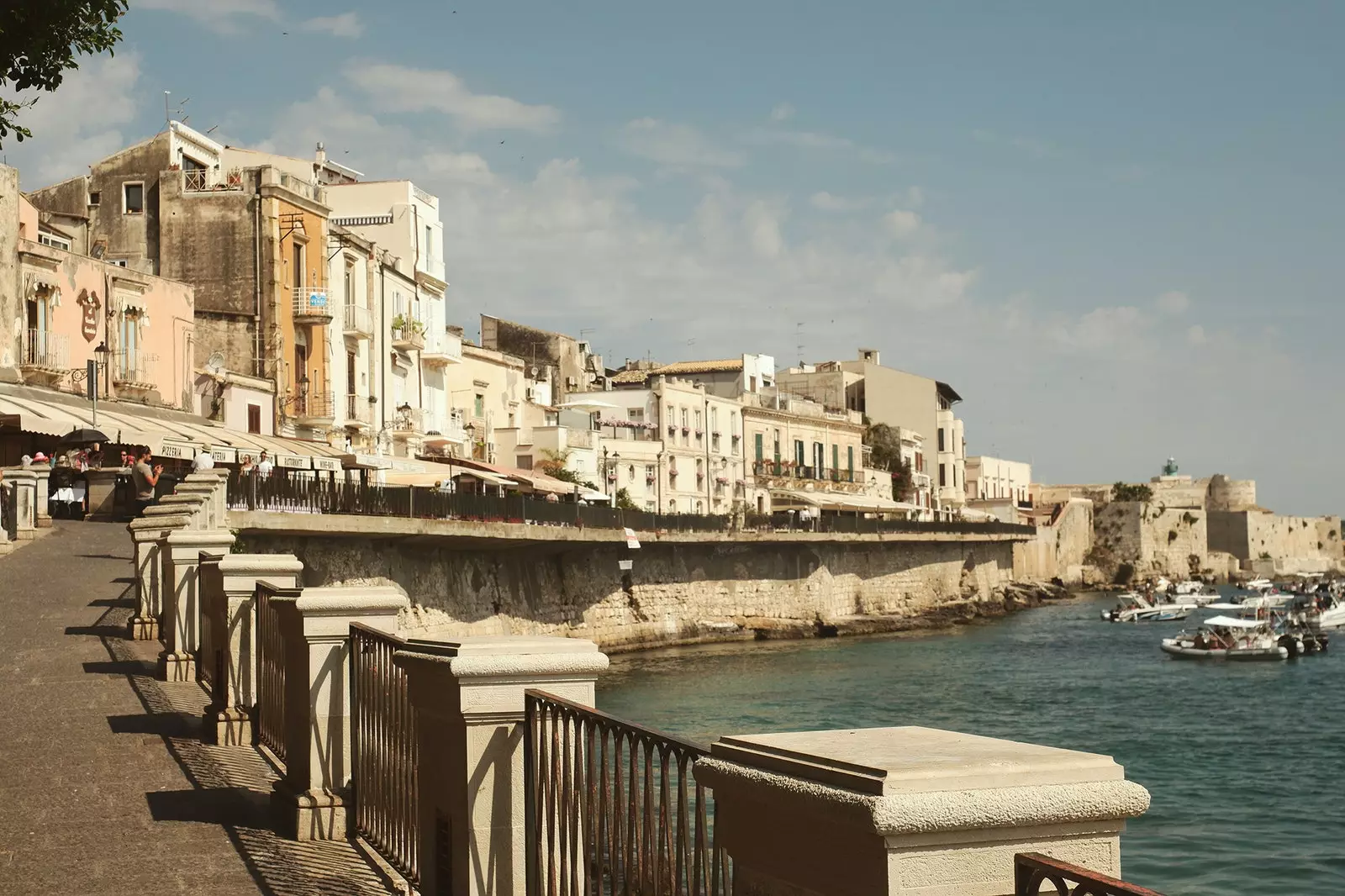
As a good Sicilian lady, Siracusa will only show herself to those who first prove to know her past
